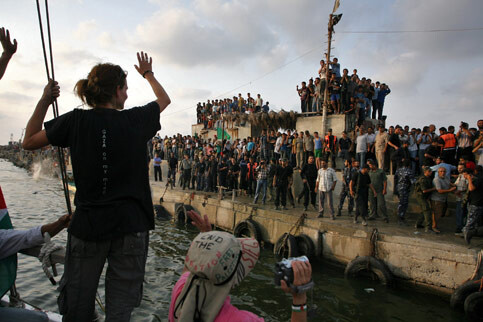The Electronic Intifada 16 August 2009

One of the boats from the Free Gaza Movement’s first voyage arrives at the Gaza port in August 2008. (Wissam Nassar/MaanImages)
A year ago, 44 ordinary people from 17 different countries sailed to Gaza in two small wooden boats. We did what our governments would not do — we broke through the Israeli siege. During the last year the Free Gaza Movement has organized seven more voyages, successfully arriving to Gaza on five separate occasions.
Regardless of Israeli threats and intimidation, Free Gaza volunteers will continue sailing unarmed boats to Gaza. Ours remain the only international ships to reach the Gaza Strip in more than 42 years. By directly challenging the Israeli military with our small boats, we have concretely demonstrated that this siege has nothing whatsoever to do with security and is simply an illegal act of collective punishment.
But the siege of Gaza cannot be separated from the crisis of checkpoints and home demolitions in Jerusalem and the rest of the West Bank, nor from the oppression of Palestinian citizens of Israel, nor from the harsh and unjust conditions of the millions languishing in refugee camps across the Middle East, nor from the plight of the more than 11,000 political prisoners held by Israel, nor from the calamity of extra-judicial killings of Palestinians by Israeli forces, particularly the killings of Palestinian children, nor from Israel’s ongoing theft of Palestinian natural resources, nor from the right of return for all Palestinians in the Diaspora. Gaza is but one bitter element of the struggle for justice for all of Palestine.
Contrary to its presentation in the mainstream media, this conflict is neither a righteous war against terrorism, nor a long-standing religious or ethnic dispute. The Israeli-Palestinian conflict is the struggle of two irreconcilable and unequal causes: the struggle of an oppressed people for freedom, justice and self-determination against their oppressors’ struggle to maintain their domination.
The purpose of nonviolent direct action and civil resistance is to take risks and put our selves in the way of injustice. We take these risks well aware of what the possible consequences may be. We do so because the consequences of doing nothing are so much worse. Any time we allow ourselves to be bullied, every time we pass by an evil and ignore it, we lower our standards and allow our world to be made that much harsher and unjust for us all.
Other international solidarity and action campaigns preceded ours, such as the European Campaign to End the Siege on Gaza, and more have begun in recent months, such as Viva Palestina, the International Movement to Open Rafah Border, Code Pink’s delegations to Gaza, and the Gaza Freedom March.
These campaigns are all important. Working together, we have been able to complement and multiply our efforts, drawing the world’s attention to the suffering caused by Israel’s illegal blockade. We have been able to bring in limited amounts of needed aid, and bring out of Gaza a handful of Palestinian students, medical patients and others. These are worthwhile labors, but they are not enough. As the great Indian resistance leader Mahatma Gandhi stated on 11 September 1924: “[The people] are as yet untouched by [our] politics … Their politics are confined to bread and salt … We must share their sorrows … Then and not till then shall we truly represent [them] …”
The truth is that all our work combined has yet to significantly impact the daily lives of the Palestinian people.
As solidarity campaigners, it’s our job to take our direction from comrades already struggling inside occupied Palestine. But as internationals we should also remind ourselves that our primary work lies in our own communities. In the end, our struggle is not about charity; the Palestinian people need justice and political action, not charity.
Viva Palestina’s journey through North Africa, on their first mission from Britain to Gaza, helped mobilize countless individuals. Their planned journey through Europe this December will mobilize countless more. Volunteers working and traveling with Viva Palestina have begun dozens of twinning projects between their communities in the West and communities inside Palestine. The fruits of these efforts are unknowable. However, there are tremendous possibilities for not only providing concrete assistance to those in need, but also for politicizing and mobilizing individuals across the world to get involved in the struggle for justice in Palestine.
Similarly, the Free Gaza Movement is working to mobilize individuals through the Right to Read campaign, and through direct lobbying of governments and the international community to actually enforce international law in regards to Palestine. We are reaching out to existing social movements and labor unions in the West, complementing existing efforts to establish and broaden boycott, divestment and sanctions campaigns against apartheid Israel.
The continuing failure of the international community to enforce its own laws and protect the Palestinian people demands that we as private citizens directly intervene to take action commensurate with the crisis. What is needed in our world today is not simply protest against the violence of occupation and oppression. What we need is a greater resolve — a new militancy rooted in the profound respect for human life, and sustained by profound disrespect for any government or group that terrorizes our sisters and brothers around the world.
More than at any time in recent memory, ordinary people around the world seem to be answering this call.
Ramzi Kysia is an Arab-American essayist and an organizer with the Free Gaza Movement (www.FreeGaza.org).





